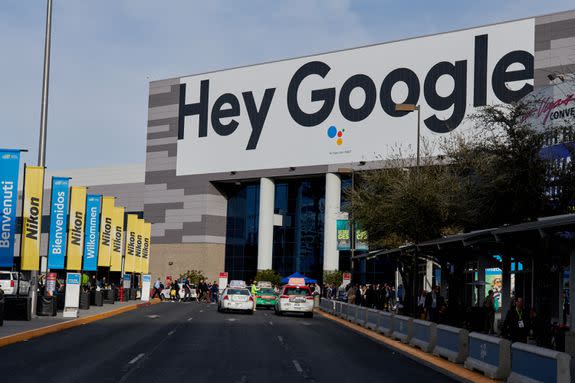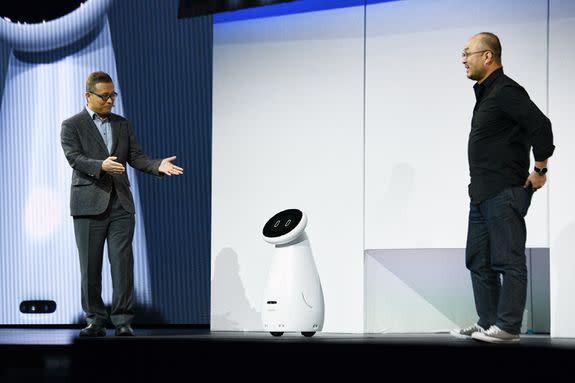CES 2019 had nothing to say about the biggest conversation in tech

While CES sets the tech trends for the year, it rarely sets the tone. The giant-size tech carnival is a great place to see the latest TVs, smart home gadgets, and self-driving vehicle tech, but it's also a bubble. Hype and excitement over mostly incremental upgrades is epidemic at the show, and it has very little to do with our real-world relationship with technology.
If there was any doubt about that, it was made jarringly clear on Thursday when news broke that Amazon-owned company Ring, fresh from a CES 2019 launch where it debuted a slew of new smart-home security products, had been using human contractors to review and label some customers' doorbell-cam footage in lieu of an actual AI.
SEE ALSO: Apple's news at CES 2019 shows it's facing some hard truths
It was concerning, even disturbing, news, but it was also familiar. For the past two years, the public has seen scandal after scandal where a familiar tech brand has played fast and loose with customer data. The bargain we all make when we click "agree" on a terms of service page has turned what was previously a thoughtless exercise into one of skepticism or even dread. The public at large is much more aware of how our data can be used... and abused.
But, if you judged by CES — especially the events of show heavyweights LG and Samsung — you wouldn't know any of that had happened. There was continued excitement about putting internet connections in everything with WiFi (and now 5G) as well as all kinds of hype around making those devices "personal" with our gadgets, appliances, and services learning our personal preferences to better tailor experiences to our liking.
The (mostly unsaid) implication is that those preferences are stored somewhere, essentially meaning our technology, and by extension the brands that create and maintain it, is profiling us. When companies tout "machine learning," by and large they mean they machine is learning about you.

Image: Bridget Bennett/Mashable
To be clear, there is nothing inherently wrong with this. But it is also inherently risky. Once your data is tracked and recorded, it becomes a commodity, something that can be bought, sold, stolen, lost, and more. While consumers want the convenience and progress tech products promise, they also want to feel that they have final say — or any say — over how their data is used. Ads that follow you around the web, propagandists targeting your news feed, randos in another country reviewing your doorbell footage — did we really, knowingly agree to all this?
To be sure, there have been a lot of overhyped data scandals. Ever since the Cambridge Analytica fiasco, we've become hypersensitive to them, and reports sometimes conflate negligent data practices with simple APIs. Letting your smartphone's native email app read your Microsoft Outlook account isn't a breach, and even if you consider the sharing of data to still be a risk, at least the trade-off you're making is pretty transparent.
That confusion, however, actually ends ends up proving a larger point: That tech companies who deal in customer data need to communicate better on how that data is being used and protected (and, no, burying things in the terms of service doesn't cut it). Contrary to popular belief, Facebook actually does a decent job of this, with its Privacy Checkup tool walking users through their settings in plain language. It's also been much more proactive about educating users about privacy issues since Cambridge Analytica.
But it shouldn't take a plethora of data scandals for a company to get proactive about privacy, and this is where CES missed a huge opportunity. It could have pushed forward the conversation about consumer data by encouraging exhibitors (especially big ones like Panasonic, Sony, and others) to talk about how they're acquiring and using consumer data. They could even create a Privacy Pavilion — a place where brands could crow, in writing and in person, about their commitment to user privacy, and show attendees could educate themselves on data practices of the industry.

Image: Bridget Bennett/Mashable
Instead we were treated to LG's tone-deaf presentation around it's ThinQ ("think-you") AI platform, which explicitly "gets to know you" so it can serve you better, with no clarity about how LG thinks that service extends to third parties. We get Samsung Bot Care, a robot that can track your health without no information on how that data will be protected. There were more than 300 sessions and keynotes at CES, and only three had any kind of privacy focus.
Consumer data is a product, and, looking at the valuations of the largest tech companies in the world, an extremely valuable one. For a show that purports to be about the most important tech products in the world, CES had shockingly little to say about it. That's more than a missed opportunity — it's a sad indication that as world-changing technologies like 5G and automation progress, the hard lessons from the past year will likely need to be learned again and again.
WATCH: This device is trying to replace your phone AND laptop


 Yahoo Finance
Yahoo Finance 